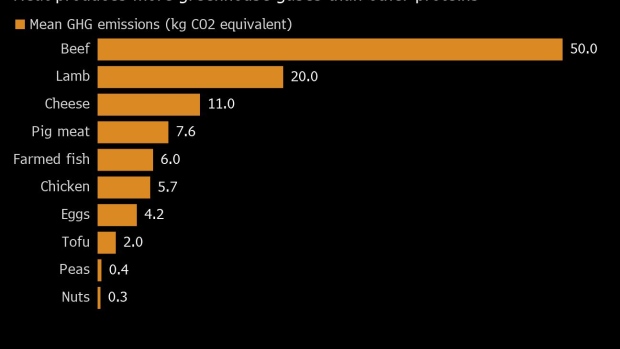Oct 27, 2021
How Green Is Your Pantry? Carbon Labels Will Let You Know
, Bloomberg News

(Bloomberg) -- How green are those breakfast sausages on your plate? What about the Lay’s potato chips you’ll snack on later? And that Perrier to wash them down?
Nestle SA, Pepsico Inc. and local brands are among the 27 companies backing a project that calculates a product’s environmental impact from farm to store and then grades it with a color-coded label. It’s the first time a partnership this big is working to find a one-size-fits-all way to assess the supply chain.
The global economy must reduce CO2 emissions to keep the planet from frying, and the food industry is responsible for as much as 35% of those. With investors scrutinizing environmental bona fides and governments publishing net-zero mandates before the COP26 climate summit, producers are being pushed to reduce their carbon food-prints.
“We’re looking to transform the food industry,” said Cliona Howie, chief executive officer of Foundation Earth, a London-based nonprofit organization leading the project.
The World Bank estimates it will cost $350 billion a year over the next 10 years to green up the supply chain and boost productivity.
Emissions start with the methane belched by cows and pigs, the gases released by rice rotting in paddies, or the chemicals spread in fertilizer. Animal-based products generate 57% of the industry’s greenhouse-gas emissions, according to a study published in the journal Nature.
Then there’s the energy used in packaging, processing and transportation.
A ready-made cheese sandwich can be responsible for as many as 953 grams of CO2 equivalents, based on estimates by London-based Mondra Global Ltd., which works with Foundation Earth.
That’s equivalent to driving a car 2.5 miles (4 kilometers), using a U.S. Environmental Protection Agency calculator.
About two dozen items, primarily from independent companies such as Finnebrogue Artisan, are labeled in U.K. stores -- with potential scores ranging from A+ to G. The foundation has assessed more than 100 products.
“This is going to give us the information to go and scrutinize suppliers, work with them to improve our chain,” said Jago Pearson, chief strategy officer at the Downpatrick, Northern Ireland-based sausage maker.
It’s also good business since consumers and investors are paying closer attention to environmental, social and governance factors.
Pepsico, which owns Lay’s, is testing whether it can swap the fertilizer used to grow potatoes for mulch containing recycled peelings. That would reduce the carbon-equivalent emissions by 70%, said Archana Jagannathan, senior director, sustainability for Pepsico Europe.
“We’re looking at this as an end-to-end transformation,” Jagannathan said. “Consumers are expecting companies to do the right thing.”
Nestle, the world’s largest food company and owner of Perrier, committed to spending $3.6 billion to green its business by 2025.
“The Foundation Earth project is one of the options which could bring this ambition to life,” said Benjamin Ware, Nestle’s global head of sustainable sourcing and climate delivery.
©2021 Bloomberg L.P.


